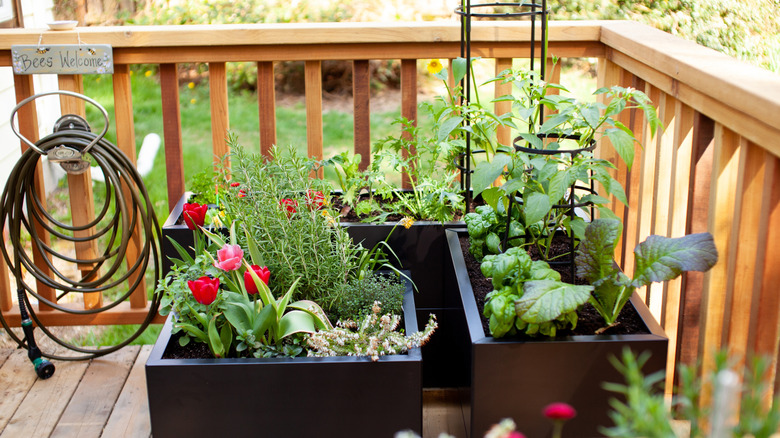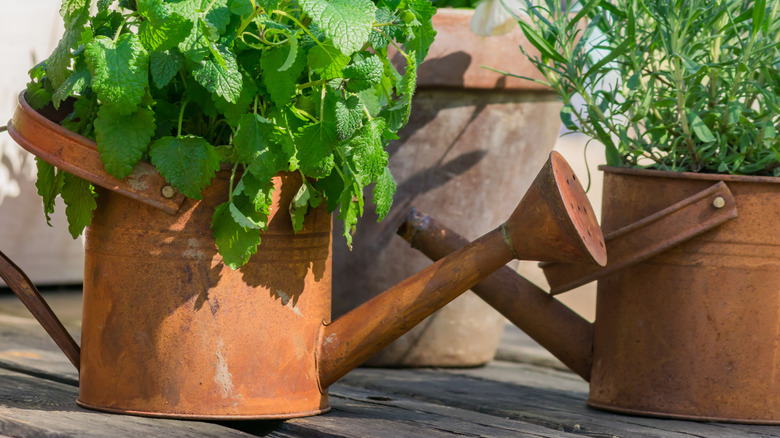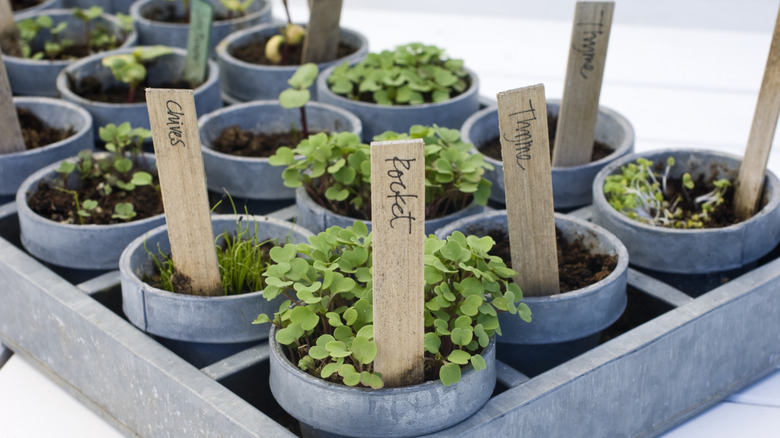The Smart Container Gardening Tip That Keeps Herbs Healthy
We may receive a commission on purchases made from links.
Researching how to create an herb garden on your patio or balcony? A vital part of the process is sourcing planters. And while aesthetics are undeniably important, the container material is, too. Certain materials may negatively affect your plant's health, something that really matters if you're growing herbs for the kitchen. Metal, in particular, is a container material fraught with confusion. As the planter rusts or corrodes, many gardeners worry about the potential for contaminants leaching into the soil being taken up by their plants' roots. Thankfully, whether the risk is valid or not, there's a simple way to err on the side of caution. Keep your herbs in their plastic nursery pots or plant them up in larger plastic containers before popping them into their metal home.
Commercially manufactured raised beds are increasingly being made from metal, and there's also a trend for using new cattle troughs as raised herb gardens. These are mostly made from galvanized steel, but could also be crafted from aluminium or stainless steel. Repurposed construction materials and vintage containers — found objects like metal roofing sheets, rusty cans that once held nails, vintage workman's lunch or fishing tackle boxes, or old metal buckets — pose potential problems, too. You don't always know their age or what type of metal you're dealing with, or what compounds the surface coatings and finishes contain. In fact, most of these containers are perfectly fine to use in the garden. The issues for herb health, and possibly even your health when you eat your homegrown greenery, arise when they start to corrode.
Are rusty containers actually a problem for your herbs?
Rust is naturally occurring iron oxide. While high concentrations of iron oxide may inhibit chlorophyll production and nutrient uptake in plants, iron is also an essential plant nutrient. Iron toxicity is uncommon in plants because iron oxide isn't water soluble, meaning it isn't easily absorbed into plant tissues. There's also, in ordinary garden settings, such a small amount of iron oxide released from a rusting container that its effects are likely negligible. In fact, there's evidence dating at least as far back as the 1960s that iron oxide could make herbs healthier. Note, however, that recent experiments use iron oxide nanoparticles (in iron nanofertilizers), which isn't the form of iron oxide flaking off your rusty patio planter.
Only items made from iron and raw steel will rust. Copper and aluminum oxidize, while zinc corrodes. Only stainless steel is (mostly) corrosion resistant. Depending on what metal your raised bed is made of, other leached compounds are more of a cause for concern than rust. Vintage and antique metal containers and new planters manufactured overseas and bought online may contain toxic heavy metals like lead. Even the paint on metal containers could be a contamination source. Galvanized steel, a common raised garden planter material, is coated in zinc and sometimes also aluminum. Research into how much zinc (and other harmful substances like cadmium) leach into the soil from these containers is minimal. Acidic soil and water can accelerate the breakdown of the zinc coating, though, like iron oxide, what leaches out is likely to be extremely minimal. Food safe galvanized steel is less of a concern.
The how-to: Protect herb health with plastic containers
This doesn't mean you can't explore unique ways to repurpose metal containers around your garden, even for edible plants. Instead, turn your metal container into a cachepot. Creating a partition between the soil and the metal is simple. First, plant your herbs in separate containers — heavy plastic or resin planters work best. A mixed 15-pack of 4, 6, and 8-inch RooTrimmer Thickened Green Plastic Nursery Pots with Drainage Holes costs just $23 and gives you lots of flexibility with arrangement of plants inside your raised bed.
Before popping the plastic potted herbs into the metal raised bed, protect the metal by removing any existing rust — scrub the surface with a lemon juice and salt paste and sandpaper — and coating it in Rust-Oleum paint, rust inhibitor, or clear enamel. Add your pots of herbs, then fill any gaps with broken terracotta, damp gravel or sand, pieces of polystyrene, bubble wrap, or waterproof foam to insulate them against heat and pad out the protective barrier between the metal and the plant. Just make sure you don't block any drainage holes.
Bonus: By using round planters inside your metal raised beds, you'll save about 50% on the volume of soil. And if you're still worried about the metal container getting too hot, even with a plastic planter barrier and the added insulating materials, choose easy-to-grow herbs that can take the heat and will thrive all summer long. Make sure, too, to thoroughly wash all the soil from your harvested herbs before you use them in cooking.


